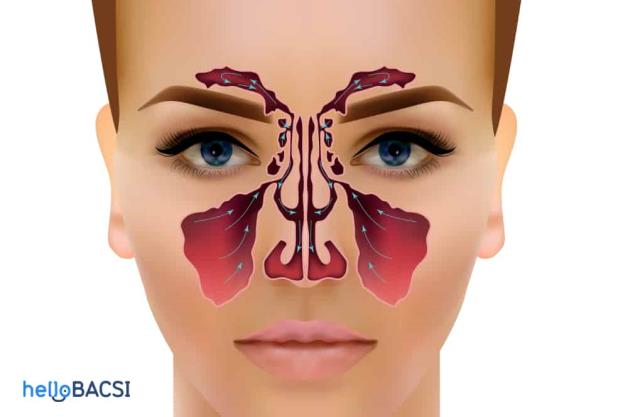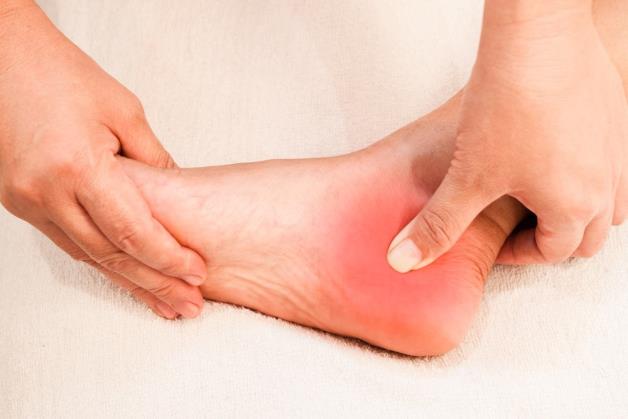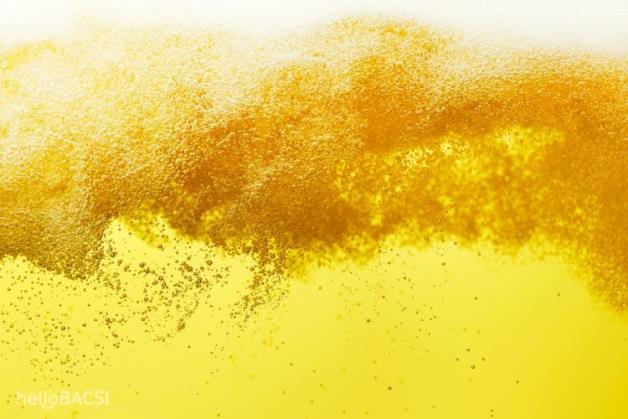Jaw swelling can be caused by many different things. Most of them are not too dangerous and can be treated easily. However, sometimes this condition is a warning sign of a more serious health problem to watch for.
Let's find out the causes of jaw swelling and how to treat this condition in the following article.
15 causes of jaw swelling
Causes of jaw swelling include the following conditions:
1. Jaw injuries
Injuries to the face or jaw can cause your jaw to become swollen, painful and bruised. In this case, you need to go to the hospital for examination immediately. If not treated properly, jaw trauma can leave many sequelae, making it difficult for you to open and close your mouth.
2. Swollen jaw due to tonsillitis
The tonsils are two large lymphoid organizations located in the nasopharynx. Their job is to prevent bacteria and other harmful organisms from entering the body through the mouth or nose. Tonsillitis can affect and cause swelling in the neck and jaw. In addition, the disease has other symptoms including:
- Sore throat
- Difficulty swallowing
- Hoarseness or loss of voice
- Ear hurt
- Headache
- Fever
- Nausea
- Tired
3. Swollen jaw due to strep throat
Strep throat is an infection of the throat and tonsils caused by group A Streptococcus bacteria. Symptoms of the disease include:
- Sore throat
- Pain when swallowing
- Swollen, red, or festering tonsils
- Swelling in lymph nodes, neck and jaw
- Appearance of small red spots on the roof of the mouth
4. Abscess around the tonsils
Abscess is the term used to refer to an inflammatory organization filled with pus, localized into a soft mass. Abscesses can develop around the tonsils as a complication of strep throat or tonsillitis.
There may be swelling in the face, especially the area around the jaw. In addition, the condition causes symptoms such as:
- Swollen lymph nodes in the neck
- Sore throat
- Hoarseness or loss of voice
- Difficulty swallowing or opening your mouth
- Headache
- Fever or chills
5. Tooth abscess

A tooth abscess occurs when bacteria enter the pulp of a tooth and form pockets of pus. If left untreated, the infection can spread to the jawbone, other teeth and tissues. Therefore, if you suspect you have a tooth abscess, you need to see your dentist as soon as possible.
Symptoms of a tooth abscess include:
- Severe toothache
- Pain spreading to the ears, jaw and neck
- Swollen jaw or face
- Red and swollen gums
- Fever
6. Inflammation around the crown
Periodontitis is an infection and swelling of the gums caused by a tooth that has only partially erupted. This condition usually occurs in the gums around wisdom teeth, third molars and last molars.
Early symptoms of the disease include pain, swelling of the gums, and accumulation of pus around the affected tooth. If left untreated, the infection can spread to the throat, causing swelling of the face and jaw.
7. Swollen jaw due to viral infection
Certain viruses can cause swelling of the jaw and lymph nodes around the jaw. These include measles, mumps, and rubella viruses. These diseases have many different manifestations, namely:
Symptoms of Measles
- Fever
- Rash
- Cough
- Runny nose
- Red eyes and tears
Symptoms of mumps
- Fever
- Swollen salivary glands
- Muscle aches
- Headache
- Tired
- Anorexia
Symptoms of Rubella
- Fever
- Rash
- Sore throat
- Red and itchy eyes
8. Mononucleosis
Mononucleosis is a disease transmitted by saliva contact, causing swelling of the lower jaw and lymph nodes in the neck. Besides, the disease can also cause other problems such as:
- Sore throat
- Fever
- Tired people
The main causative agent is the Epstein Barr virus. Like measles, mumps and rubella, there is currently no cure for the disease. However, the symptoms of the disease usually improve and disappear after about 2–4 weeks.
9. Sưng hàm do bệnh Lyme
Bệnh Lyme là bệnh nhiễm trùng do vi khuẩn Borrelia. Bệnh có thể lây truyền từ động vật sang người qua vết cắn của ve. Triệu chứng đặc trưng nhất của bệnh là những quầng ban đỏ xung quanh vết cắn. Ở mức độ tiến triển, căn bệnh này có thể gây ra các triệu chứng ảnh hưởng đến hàm như:
- Sưng đau hoặc cứng cơ hàm
- Đau khớp hàm
- Khó khăn khi cử động hàm
- Có các âm thanh lạ khi đóng hoặc mở miệng
Một số triệu chứng toàn thân khác của bệnh bao gồm:
- Đau đầu
- Cứng cổ
- Rũ một bên mặt
- Đau nhức xương, khớp và cơ bắp
- Đau dây thần kinh
- Tim đập nhanh
- Chóng mặt
- Thở hụt hơi
10. Sưng hàm do u nang hàm
U nang là cấu trúc dạng túi chứa đầy chất lỏng, tồn tại ở thể nửa rắn hoặc khí với nhiều kích thước khác nhau. U nang có thể phát triển ở bất cứ nơi nào trong cơ thể, bao gồm cả hàm.
U nang hàm hình thành bên trong xương hàm hoặc xung quanh chân răng. Khi u nang hàm phát triển, nó có thể gây ra các triệu chứng sau:
- Cảm giác tê hoặc ngứa ran ở môi, nướu và răng
- Răng lung lay
- Yếu xương hàm
- Sưng hàm
11. Viêm khớp dạng thấp

Viêm khớp dạng thấp là bệnh lý khớp tự miễn mãn tính gây sưng, đau và cứng khớp. Dấu hiệu thường gặp của tình trạng này là đỏ và viêm ở khớp cổ tay, chân, đầu gối…
Trong một số trường hợp, người bệnh có thể xuất hiện các triệu chứng làm thay đổi kích thước hàm như sưng hạch bạch huyết và viêm tuyến nước bọt. Bên cạnh đó, viêm khớp thái dương hàm (TMJ) cũng là một biểu hiện phổ biến của căn bệnh này.
12. Sưng hàm do bệnh Lupus
Lupus là một rối loạn tự miễn có thể ảnh hưởng đến bất kỳ bộ phận nào của cơ thể. Nếu không được điều trị và can thiệp tích cực, lupus có thể đe dọa tính mạng.
Sưng hàm dưới, mặt, tay, chân và bàn chân là những dấu hiệu thường gặp của bệnh. Các triệu chứng phổ biến khác bao gồm:
- Đau hoặc sưng khớp
- Đau và loét miệng
- Sưng hạch bạch huyết
- Phát ban hình cánh bướm trên má và mũi
13. Hội chứng mệt mỏi kinh niên
Hội chứng mệt mỏi kinh niên là một rối loạn được đặc trưng bởi tình trạng mệt mỏi mãn tính nhưng không liên quan đến bất kỳ tình trạng tiềm ẩn nào. Các triệu chứng của hội chứng này bao gồm:
- Mệt mỏi
- Sương mù não
- Đau cơ hoặc đau khớp không giải thích được
- Sưng hạch bạch huyết ở cổ hoặc nách
14. Tác dụng phụ của một số loại thuốc
Mặc dù hiếm gặp nhưng một số loại thuốc có thể gây sưng các hạch bạch huyết. Chúng bao gồm thuốc chống động kinh phenytoin (Dilantin, Phenytek) và các loại thuốc được sử dụng để ngăn ngừa bệnh sốt rét.
15. Sưng hàm do ung thư

Ung thư tuyến giáp, ung thư đầu, cổ và ung thư miệng đều có thể gây sưng ở các vị trị như cổ hoặc hàm. Các loại ung thư này có thể được nhận biết thông qua các triệu chứng sau đây:
- Xuất hiện một khối cứng hoặc có hình dạng bất thường ở vùng đầu cổ
- Lở loét khó lành
- Cảm giác đau ở cổ, họng hoặc tai
- Sút cân không kiểm soát
- Mệt mỏi
Ngoài ra, một số loại ung thư ở các vị trí khác cũng có thể lan đến các hạch bạch huyết ở cổ hoặc hàm, gây ra tình trạng sưng.
Chẩn đoán tình trạng sưng hàm
Để chẩn đoán nguyên nhân gây ra tình trạng bị sưng hàm, trước tiên, bác sĩ sẽ tiến hành thu thập thông tin bệnh sử của bạn, bao gồm các vấn đề như triệu chứng đang gặp phải, các chấn thương và bệnh lý trong thời gian gần đây. Dựa trên những thông tin này, bác sĩ có thể tiến hành thêm các kiểm tra và xét nghiệm sau:
- Kiểm tra thể chất
- X-ray to see if there is an injury or tumor
- Blood test to check for infection
- CT scan or MRI to look for signs of disease, including cancer
- Biopsy in cases where cancer is suspected or there is not enough information to determine the cause of swelling
Treatment of jaw swelling
Treatment for swelling will depend on what's causing it. Depending on the specific case, the patient can apply home remedies or medical treatment.
Home Remedies
Jaw swelling and its accompanying symptoms can be controlled with the following simple measures:
- Take time to rest
- Apply cold to the swollen area to reduce swelling
- Take over-the-counter anti-inflammatory drugs
- Take over-the-counter pain relievers
- Eat soft, easy-to-swallow foods and drink plenty of water
- Apply warmth to the affected lymph nodes
Treatment with specialized methods
Depending on the cause, jaw swelling can be treated with the following medical measures:
- Fix dislocated or broken bones or joints
- Using antibiotics for bacterial infections
- Taking corticosteroids to reduce inflammation
- Surgery
- Cancer treatments, such as radiation and chemotherapy
When do you need to go to the hospital?
If the cause of the swelling is an injury, you should contact your doctor immediately. Besides, you also need to go to the hospital as soon as possible if your jaw swelling is accompanied by the following symptoms:
- High fever
- Headache
- Tired
- Can't move my mouth
- Swollen tongue or lips
- Shortness of breath













